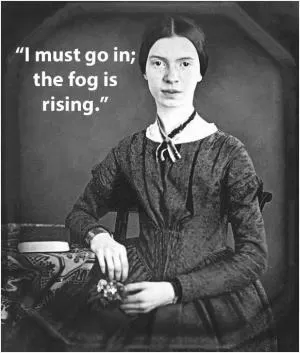If I feel physically as if the top of my head were taken off, I know that is poetry

If I feel physically as if the top of my head were taken off, I know that is poetry
Emily Dickinson, one of the most renowned and enigmatic poets in American literature, once famously wrote, "If I feel physically as if the top of my head were taken off, I know that is poetry." This statement encapsulates the intense and visceral experience that Dickinson believed poetry should evoke in both the poet and the reader.For Dickinson, poetry was not merely a form of artistic expression, but a deeply personal and transformative experience. Her poems often explore themes of love, death, nature, and the human experience with a raw and unfiltered intensity that can be both exhilarating and unsettling. Dickinson's unique style, characterized by her use of unconventional punctuation, capitalization, and syntax, adds to the sense of disorientation and dislocation that her poetry often conveys.
In the context of Dickinson's own life, the idea of feeling as if the top of her head were taken off can be seen as a metaphor for the intense emotional and intellectual experience of writing poetry. Dickinson was known for her reclusive nature and her intense introspection, and many of her poems reflect a deep sense of longing, despair, and existential questioning. In this sense, the act of writing poetry for Dickinson was a way of grappling with the complexities of the human condition and seeking to make sense of the world around her.
Furthermore, Dickinson's statement can also be interpreted as a reflection of the transformative power of poetry itself. In her view, poetry has the ability to transcend the limitations of language and logic, and to connect us to something deeper and more profound than mere words can express. When we read a poem that resonates with us on a deep emotional level, we too may feel as if the top of our heads were taken off, as we are transported to a place of heightened awareness and understanding.












 Friendship Quotes
Friendship Quotes Love Quotes
Love Quotes Life Quotes
Life Quotes Funny Quotes
Funny Quotes Motivational Quotes
Motivational Quotes Inspirational Quotes
Inspirational Quotes